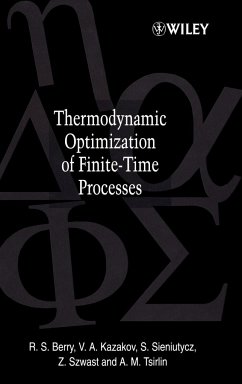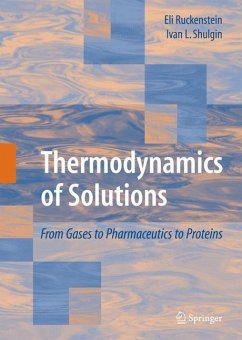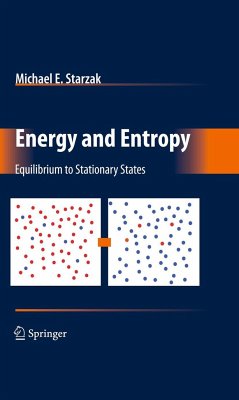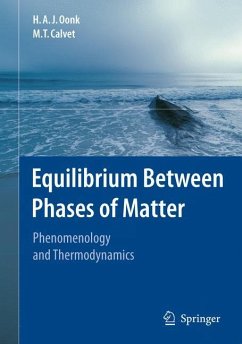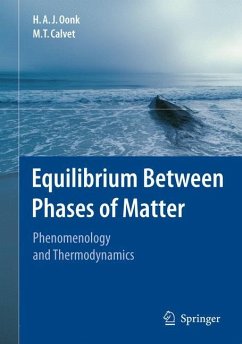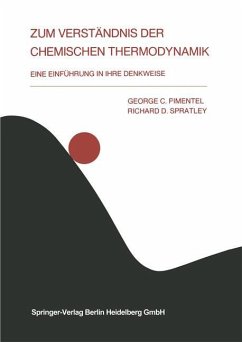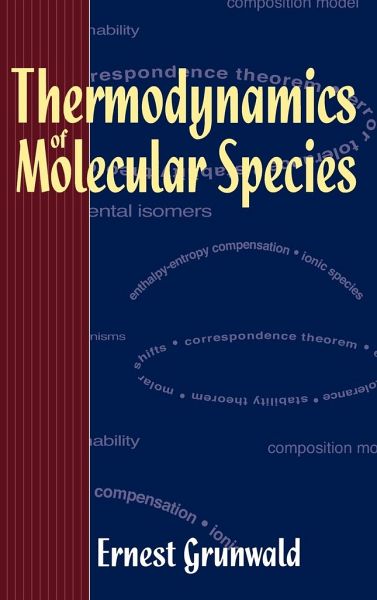
Thermodynamics of Molecular Species
Versandkostenfrei!
Versandfertig in über 4 Wochen
205,99 €
inkl. MwSt.

PAYBACK Punkte
103 °P sammeln!
An updated and fresh perspective of the subject based on the concepts that the thermodynamic properties of a system are independent whether composition is specified in terms of formal components or molecular species and that the laws of thermodynamics are independent of the observational time-scale. By applying these concepts, the author has derived approximately 20 general theorems concerned with the thermodynamic properties of molecular species and their relationships to those of the formal components. Grunwald defines molecular species to include all participants in reaction mechanisms. Pro...
An updated and fresh perspective of the subject based on the concepts that the thermodynamic properties of a system are independent whether composition is specified in terms of formal components or molecular species and that the laws of thermodynamics are independent of the observational time-scale. By applying these concepts, the author has derived approximately 20 general theorems concerned with the thermodynamic properties of molecular species and their relationships to those of the formal components. Grunwald defines molecular species to include all participants in reaction mechanisms. Proved theories are supplemented with verbal explanations and explicit examples. Applications chapters include environmental isomers in liquids and thermodynamic properties of water and aqueous systems. Extra thermodynamic chapters feature interionic attraction theory and structure-energy correlation. A much-needed expansion of traditional chemical thermodynamic concepts--essential reading for today's advanced students and research professionals
Reflecting the current operational practice of chemistry, this unique book provides an important update of traditional chemical thermodynamics, especially the thermodynamics of liquid solutions. Using a flexible composition model that enumerates both the formal components of a system and the molecular species derived from them, Thermodynamics of Molecular Species introduces a set of general theorems and proofs that address a range of significant phenomena beyond the reach of traditional chemical thermodynamics, such as enthalpy-entropy compensation, molar shifts, and thermodynamic error tolerance. Dr. Grunwald's novel approach creates a natural framework for mechanistic studies of molecular phenomena, while at the same time avoiding some of the complexity of statistical thermodynamics. The book's features include:
A broad definition of molecular species that includes all participants in reaction mechanisms: reactants, products, substrates, catalysts, reactive intermediates, and transition states
Solid experimental evidence supported by explicit examples across a breadth of areas--including solvation, water and aqueous solutions, environmental isomers, ions, and ion pairs
Thermodynamic aspects of interionic attraction theory and of structure-energy correlations
Almost 100 figures and diagrams that express abstract and mathematical ideas in clear and concrete terms
Reflecting the current operational practice of chemistry, this unique book provides an important update of traditional chemical thermodynamics, especially the thermodynamics of liquid solutions. Using a flexible composition model that enumerates both the formal components of a system and the molecular species derived from them, Thermodynamics of Molecular Species introduces a set of general theorems and proofs that address a range of significant phenomena beyond the reach of traditional chemical thermodynamics, such as enthalpy-entropy compensation, molar shifts, and thermodynamic error tolerance. Dr. Grunwald's novel approach creates a natural framework for mechanistic studies of molecular phenomena, while at the same time avoiding some of the complexity of statistical thermodynamics. The book's features include:
A broad definition of molecular species that includes all participants in reaction mechanisms: reactants, products, substrates, catalysts, reactive intermediates, and transition states
Solid experimental evidence supported by explicit examples across a breadth of areas--including solvation, water and aqueous solutions, environmental isomers, ions, and ion pairs
Thermodynamic aspects of interionic attraction theory and of structure-energy correlations
Almost 100 figures and diagrams that express abstract and mathematical ideas in clear and concrete terms






